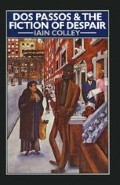Abstract
‘It was somewhere during the years of the early New Deal that I rejoined the United States’.1 Dos Passos’ private secession at the time of the Sacco-Vanzetti executions had not led him to join any organised movement of dissent: he retreated, as he wrote, into this ‘private conscience’. But he was still politically alert, and his activities led him naturally into contact with Communists. His experiences were disillusioning. Among the Harlan County miners and in Spain, Dos Passos was shocked by the ruthlessness and cynicism of those who professed to be fighting for the just society. Even in USA, one had sensed the repercussions of this in the harsh discipline of the party tacticians, the treatment of Mary French by Don Stevens, the air of conspiracy and deceit. Yet there it had formed, in the total context of the work, a mid-point of reflecting ironies between the terrible tragedy of the Sacco-Vanzetti affair and the entropic lives of the characters enmeshed in a sordid struggle for wealth and power. There was no direct assault upon the Communist faith.
Preview
Unable to display preview. Download preview PDF.
Notes
John Dos Passos, The Theme is Freedom (New York: Dodd, Mead, 1956) p. 103.
John Dos Passos, Adventures of a Young Man (London: Constable, 1939) p. 4.
Malcolm Cowley, ‘Disillusionment’, New Republic xcix (14 June, 1939) p. 163.
Chester E. Eisinger, Fiction of the Forties (University of Chicago Press, 1963) p. 122.
Arthur Mizener. ‘The Gullivers of Dos Passos’ in Dos Passos, the Critics and the Writer’s Intention (Carbondale: Southern Illinois University Press, 1971).
John Dos Passos, Number One (London: Constable, 1944) p. 3.
John Dos Passos, ‘Carlo Tresca’, The Nation (23 Jan 1943) 124.
Louis D. Rubin, Jr, ‘All the King’s Meanings’, The Georgia Review VIII. (winter 1954) 428.
Alfred Kazin, ‘Where Now Voyager?’, New Republic (15 Mar 1943) 353.
Malcolm Cowley, ‘Washington Wasn’t Like That’, New Republic cxx (17 Jan 1949) 23.
John Dos Passos, The Fourteenth Chronicle, ed. Townsend Ludington (London: Deutsch, 1974) p. 583.
John Dos Passos, Chosen Country (Boston: Houghton Mifflin, 1951) p. 485.
John Dos Passos, Most Likely to Succeed (New York: Prentice-Hall, 1954) P. 3.
John Dos Passos, The Great Days (London: Robert Hale, 1959) p. 3.
John Dos Passos, Midcentury (London, André Deutsch, 1961) p. 120.
James T. Farrell, Reflections at Fifty (London: Neville Spearman, 1956) p. 65.
Copyright information
© 1978 Iain Colley
About this chapter
Cite this chapter
Colley, I. (1978). ‘Rejoining the United States’: District of Columbia and the Later Fiction. In: Dos Passos and the Fiction of Despair. Palgrave, London. https://doi.org/10.1007/978-1-349-03574-8_6
Download citation
DOI: https://doi.org/10.1007/978-1-349-03574-8_6
Publisher Name: Palgrave, London
Print ISBN: 978-1-349-03576-2
Online ISBN: 978-1-349-03574-8
eBook Packages: Palgrave Literature & Performing Arts CollectionLiterature, Cultural and Media Studies (R0)

